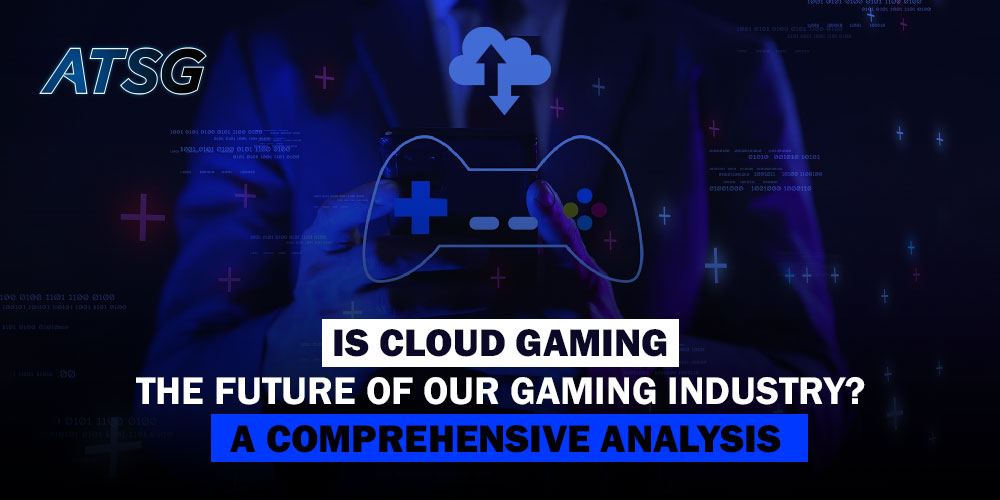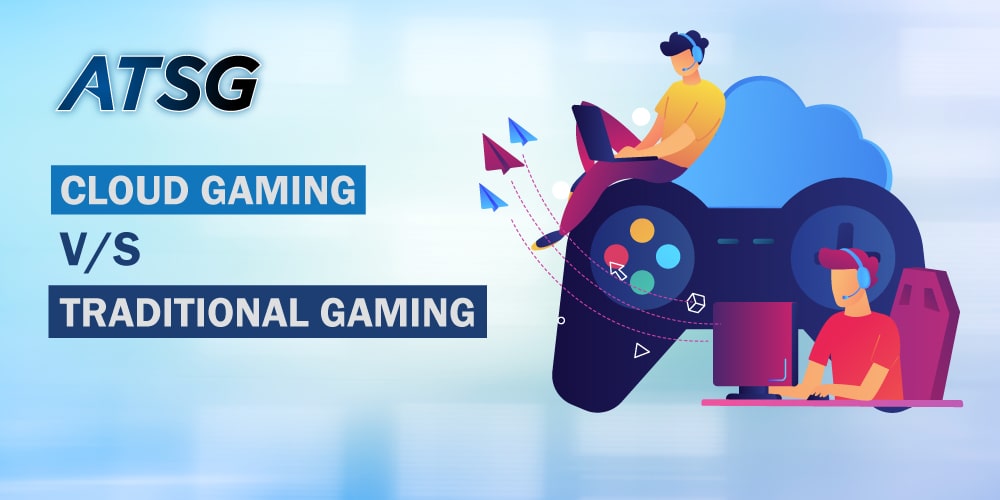The inception of Cloud gaming definitely marked a paradigm shift in the whole industry. Even though Cloud gaming did face skepticism about its potential impact, being a niche concept at the time, the landscape has transformed dramatically since then.
In 2021, the global Cloud gaming market crossed the remarkable threshold of USD 1 Billion, which is a clear testament to its growing relevance and potential. And, the improvement in internet infrastructure and data center capabilities paved the way for seamless and high-quality gaming experiences across a wide range of devices.

As we look ahead, the trajectory of Cloud gaming is un-deniably poised for exponential growth. The collaborative integration of Cloud gaming with emerging technologies, like Virtual Reality (VR) and Augmented Reality (AR), also promises a future that could re-define immersive experiences and real-time interactivity.
In this blog, we discuss the rapidly evolving landscape of the gaming industry, and how is this impacted by the surge in Cloud gaming.
Also Read: AI & ML: The Dynamic Duo of Cloud Security
Exploring the Evolving Landscape of Cloud Gaming
The journey of Cloud gaming started back in the 90’s, where the concept of online streaming of games captured some traction. However, the constraints imposed by earlier technologies did hinder this new concept.
Challenges like latency were eventually countered by technological progress, including 5G networks. Currently, Cloud gaming stands as a transformative force that is being embraced by gamers across the globe.
Today, while the adoption of Cloud gaming is on the rise, the question arises as to whether it can compete with the hardware-based consoles out there. Remarkably, smart phones have now become so powerful, they are inching closer to matching the performance of gaming consoles. Combine that with cutting edge technologies like edge computing and 5G networks, and we can attain a next-level Cloud gaming experience.
Also Read: Transforming Online Gaming with AI & Cloud Computing
Cloud Gaming v/s Traditional Gaming
The most prominent difference between the traditional and Cloud gaming experience is that the former requires investment in expensive hardware. With Cloud gaming, users can easily play games on any device, simply with an internet connection and a subscription. This is perfect for someone looking to save money, or is only interested to play a few games.

The other factors that distinguish both the gaming experience is convenience and accessibility. Cloud gaming is a lot more convenient, as games are not required to lug around bulky consoles everywhere, just to be able to play their favorite games. They can just do it “on the go” through remote cloud servers.
Not to mention the variety of choices that gamers get with Cloud gaming, without having to commit purchasing all of them. The cost associated with traditional gaming consoles is also significantly higher, as compared to Cloud gaming.
Another difference is that the speed of your internet connection is key in delivering a lag-free Cloud-based experience. Most of the traditional gaming consoles do not require a very high end internet connection to deliver a flawless gaming experience.
Ultimately, it all comes down to the personal preferences of individual players, as they choose between the two gaming “worlds”.
Also Read: Cloud Computing: The Future of the Gaming Industry
The Benefits of Cloud Gaming
In this section, we shed light on some of the features that have enhanced the overall appeal of Cloud gaming among the masses.
- With Cloud gaming, you no longer have to endure lengthy downloads and patches. Cloud-based games can update seamlessly on remote servers, saving you a lot of time and storage related hassles.
- The best part is that you can get rid of costly consoles and the need for constant upgrades. Cloud services will take charge, and manage the processing of Cloud games. This way, you can play games even on modest, low spec devices.
- Additionally, the everywhere accessibility and portability of Cloud gaming lets you enjoy games on a wide array of devices, wherever you have decent internet connectivity.
- What’s more, your game and user data will stay safe within secure servers and encrypted transmission. This eliminates the need for local backups.
- Furthermore, the fact that you can now play graphics-intensive games, even on devices that cannot typically handle them, is too good a feature to ignore. Cloud Service Providers (CSPs) take care of this demanding work, and all the technical heavy-lifting, while you enjoy your games.
That said, it is also important to recognize that Cloud gaming does face certain challenges, in terms of latency and connection stability. This can be problematic, especially in fast-paced genres.
However, despite these challenges, advancements in technology and infrastructure are continuously improving the Cloud gaming scene. As soon as these issues are addressed in the near future, Cloud gaming has the potential to revolutionize the entire gaming industry.
Also Read: Emerging Technologies Transforming Digital Workplaces
The Future Prospects of Cloud Gaming
Given the meteoric rise in technology, the future of Cloud gaming does look promising. It has been forecast that in 2023, the global consumer spending on Cloud gaming across all platforms could surpass USD 3.8 Billion. According to another estimate, the worldwide player count will hit a whopping 3.38 billion, by the end of year 2023. These trends indicate the rising importance of Cloud-streamed gaming (CSG), especially in today’s landscape.
Conclusion
Cloud gaming holds immense potential to shape the future of the world-wide gaming industry. As it transcends device related limitations and geographical boundaries, we have entered into an era of even more inclusive and immersive gaming experiences.
You can now enjoy un-paralleled gaming and graphics experience through ATSG’s Cloud Computing solutions. Our Desktop as a Service (DaaS) solutions can seamlessly fuse cutting-edge Nvidia GPUs with powerful Cloud desktops. This results in un-matched performance for graphics-intensive workloads, including high-end gaming.
Contact ATSG for state-of-the art Managed IT Services, Cloud Computing, Technology and Cybersecurity solutions for your enterprise.




